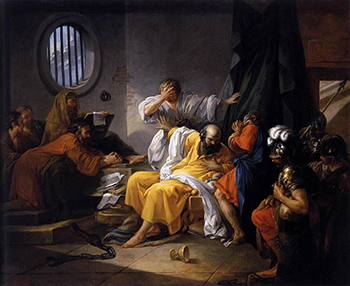From Our Archive
Debie Thomas, "It's All About Love" (2021) and "As I Have Loved You" (2018).
For Sunday April 28, 2024
Lectionary Readings (Revised Common Lectionary, Year B)
1 John 5:1-6
John 15:9-17
Psalm 98
This Week's Essay
THANK YOU to Michael Fitzpatrick for a six-week series of lectionary essays from Easter to Pentecost. Michael was a regular staff writer for JWJ from 2020 to 2023. He is a U. S. Army veteran and philosopher. He served five years in the Army as a Chaplain's Assistant, which included two deployments to Iraq during 2004-05 and 2006-08. Michael is finishing his PhD at Stanford University.
Plato’s telling of the trial and death of Socrates is quite paradoxical. The Athenian Senate, providing all the trappings of a show trial, condemns Socrates to suffer the death penalty for “corrupting the youth” and “preaching false gods,” yet he says they can do him no harm. Socrates’ disciples are so distraught some of them try to break him out of prison, but he refuses to go. On the day of his execution, Socrates assures those who gather to say their goodbyes that his destiny is the land of the blessed, and it is those who condemned him to death who should be pitied.
In later writings, Plato defended Socrates’ perspective that even a cruel and unjust death as a good person is better than living with riches and happiness gained through cruelty, deception, and exploitation. In one of his dialogues, the Gorgias, Plato imagines Socrates telling a couple notable Greek intellectuals that “it is better to suffer wickedness than commit it.” His interlocutors, Polus and Callicles, are utterly flummoxed by this assertion. They cannot understand how someone who has a successful career in politics or military command or trade by taking advantage of others to get ahead has a worse life than someone who is never cruel or unkind or seeks power over others and who, because of their gentleness, is abused, harassed, and perhaps even murdered by those with power.
 |
|
The Death of Socrates, oil on canvas by Jacques Philippe Joseph de Saint Quentin, 1762.
|
Plato’s notion that it is always better to be good and just even if it doesn’t get you ahead in life and even if you suffer injustice for your principled stance (think Dr. King in the Birmingham jail) has significant resonance with the lives of those who earnestly follow God.
David Brooks has recently told the story of Etty Hillesum, a young Dutch Jewish woman living in the Netherlands in the 1940's when Nazi Germany invaded and occupied her country. Although initially a non-observant Jew, Etty found herself compelled into prayer during this time. Her restless searching for God led her to read deeply from the Psalms and later from the Gospels. As she pressed into the presence of God in her life, she discovered how much beauty in the world around her she had been missing, from the radiance of the flowers in the fields to the textures of a friend’s clothing. She was surrounded by one of the most awful moments in Dutch history and yet she inexplicably found the joy of God welling up inside her.
In 1942 when the Nazi incarceration of Jews reached the Netherlands, Etty refused to flee the country, instead going to work at Westerbork where she served Jewish prisoners in transit to Nazi concentration camps. She provided meals and medical care, assisted in squaring away affairs, and she mailed letters for her Jewish sisters and brothers before they were sent off. Those who survived the war and remembered her described her as a person of inexplicable warmth and compassion amidst a godforsaken scene.
A year later, her own name came up for internment, and Etty was shipped off to Auschwitz. When she left, she wrote on a piece of paper, “The Lord is my high tower,” quoting Psalm 18. Those were her last recorded words.
From a worldly perspective, it would seem that Etty had a terrible life that ended with her unjust murder as part of the Holocaust. Yet from the perspective of faith, Etty lived for that which rust and moth and Nazi executioners cannot destroy. If Plato’s maxim is that it is better to die doing what is good than live committing wickedness, Jesus adds in our Gospel reading that it is better to lay down our lives for our friends than to live only for ourselves. For that is what love is, Jesus tells us. Etty was loving her Jewish neighbors in their hour of greatest need, even though she knew doing so would be fatal. In her love, she had victory over her captors, even when they executed her.
 |
|
Photograph of Etty Hillesum.
|
These stories illuminate the full meaning of St. John’s remarkable claims in 1 John 5. He tells his readers that loving God is keeping God’s commands. Think of God’s commands as what Etty was doing in serving imprisoned Jews at her transit hub. She seemed like a slave, a pawn in a nightmarish political snare tightening around her and her people. Yet by obeying God’s commands, she loved God, and so had “a victory that overcomes the world.” How can this be? How could Etty’s life be one of victory over the powers dominating her people?
Jesus’ story is quite similar to the stories I’ve been retelling. Jesus, venerated by his followers as the long-awaited Jewish messiah, not only fails to liberate Judea and Samaria from Roman occupation, he also gets himself crucified! Yet within weeks of his ignominious public execution Jesus’ followers were running around Jerusalem proclaiming that God had raised Jesus from the dead, and over the next few years they insisted that Jesus had been exalted by God to be Lord over the whole earth and the cosmos!
In our previous Eastertide readings John has taught us that, by his death, Jesus has purified us from all sin (1.7). By his resurrection Jesus has destroyed the devil’s work (3.8). Because Jesus has first loved us we are free to love others utterly and completely (4.11). Although Jesus’ life and death seems like a failure by worldly standards, Jesus actually accomplished the ultimate act of love that allows us to pass from death to eternal life (3.13).
Rooted in Jesus’ victory, those who love God and love others invoke a power that is greater than any earthly government or military. Etty’s Nazi jailers held all the physical power over her life, yet all they could achieve was a culture of death and paranoia. No matter how hard they tried to demoralize Etty her joy and willingness to love wastefully only grew.
Etty’s life embodies John’s most extraordinary claim, that “God’s commands are not burdensome, for everyone born of God overcomes the world” (5.3–4). Although it can seem like Etty was an exceptional person, a moral “Sabrina Ionescu” capable of doing impossible acts of love that the rest of us will never achieve, John’s message implies that in one sense, her acts of devotion weren’t difficult at all. If God in Jesus has already overcome the worldly powers, then we are free to just do what God commands unfettered. Etty found herself serving as if it was breathing. She laid down her life in love because God had already overcome the world for her.
 |
|
Barracks at Camp Westerbork in the Netherlands where Etty worked before her own deportation.
|
Not just anyone can become an Etty Hillesum. John is clear that those who “overcome the world” are “born of God.” If we have only a worldly birth, then the commands of God are burdensome, because we are acting from our own strength alone. But when we are born again — that is, when we participate in Christ’s death and resurrection to become new people living within Jesus’ eternal life — then we are living and loving by the strength of God first loving us.
There can be no compromise between a perspective that says the lives of Socrates, Jesus, and Etty Hillesum (and saints like her) are failures, and the perspective of God that says they have overcome the world. We must study the scriptures, pray to our God, and with the Church seek the perspective of God so that we too can participate in the victory that overcomes the world. We must be born of God, just as Christ was born of God.
The lesson here is not that we are all to seek out monumental moral acts like that of Etty Hillesum so that we can prove our love for God. For most of us, obeying God’s commands means something as simple as letting the garbage disposal woman know how grateful we are that she has picked up our waste, or changing a bed pan for an aging parent. All these acts of laying down our lives for another are not burdensome if we do them with God. We are not the source of such moral courage. Instead, in every moment we simply focus on the God who first loved us, who sent Jesus as an atoning sacrifice to overcome the world for us, so that we might be free to lay down our lives for others — even when we do not want to, and especially when the world thinks us mad for doing so.
Weekly Prayer
William Boyd Carpenter (1841–1918)
Before Thy Throne, O God, We Kneel
Before thy throne, O God, we kneel:
give us a conscience quick to feel,
a ready mind to understand
the meaning of thy chastening hand;
whate'er the pain and shame may be,
bring us, O Father, nearer thee.Search out our hearts and make us true;
help us to give to all their due.
From love of pleasure, lust of gold,
from sins which make the heart grow cold,
wean us and train us with thy rod;
teach us to know our faults, O God.For sins of heedless word and deed,
for pride ambitions to succeed,
for crafty trade and subtle snare
to catch the simple unaware,
for lives bereft of purpose high,
forgive, forgive, O Lord, we cry.Let the fierce fires which burn and try,
our inmost spirits purify:
consume the ill; purge out the shame;
O God, be with us in the flame;
a newborn people may we rise,
more pure, more true, more nobly wise.
Michael Fitzpatrick cherishes comments and questions via m.c.fitzpatrick@outlook.com
Image credits: (1) Fine Art America; (2) Wikimedia.org; and (3) Wikimedia.org.





